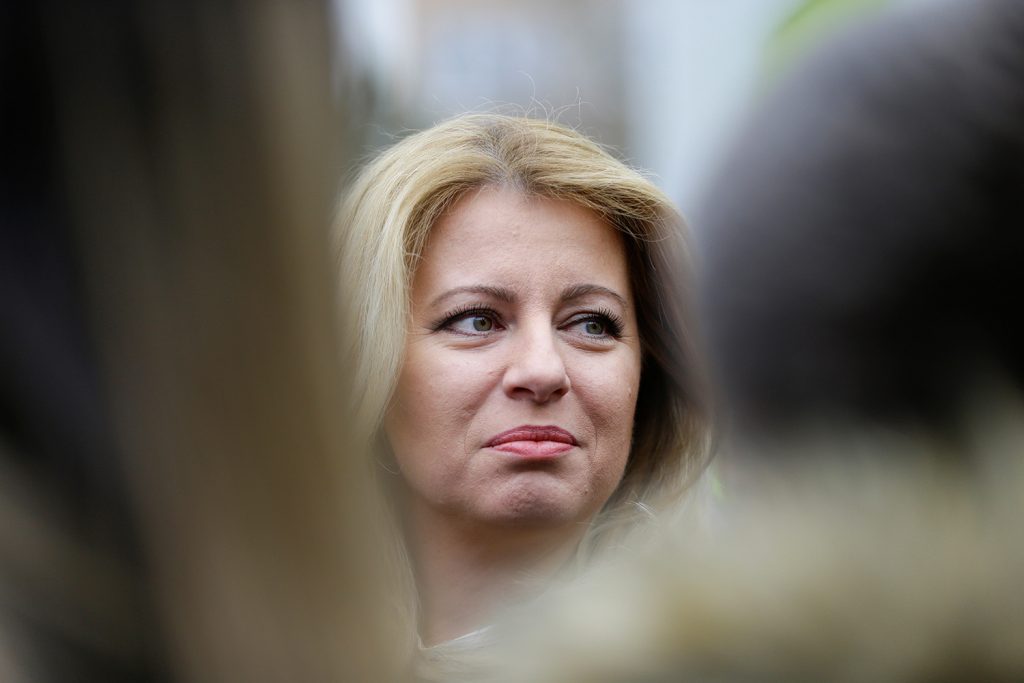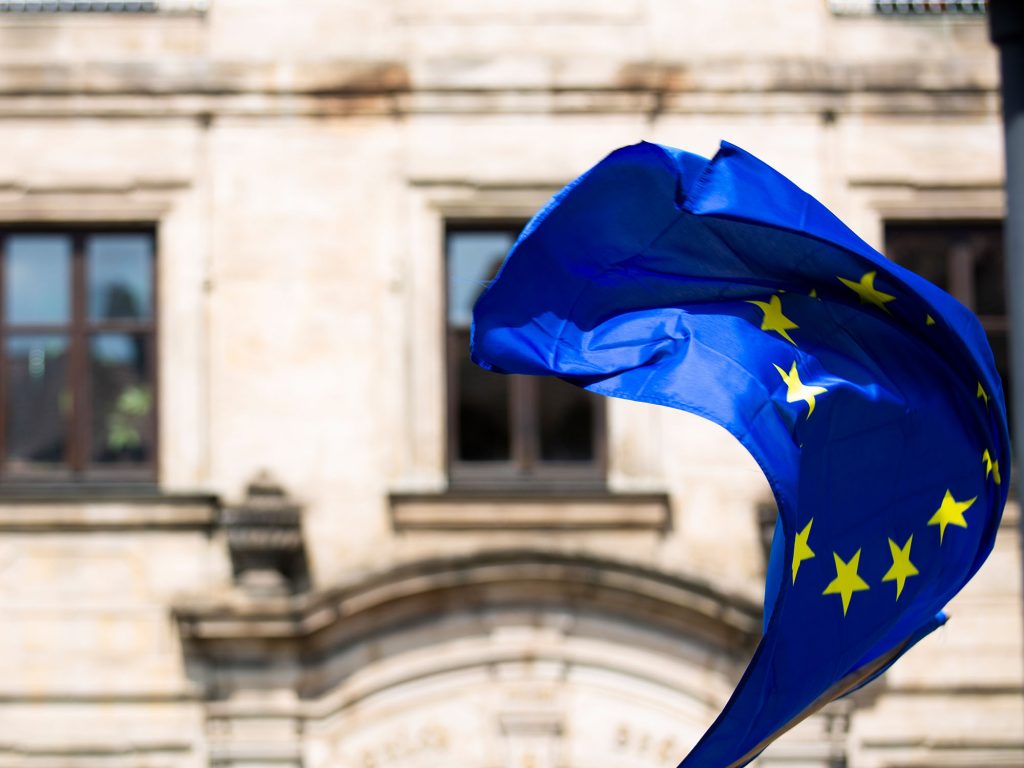Watch the EU-US Future Forum
Event transcript
Speaker
H.E. Zuzana Čaputová
President of the Slovak Republic
Introduction
Damon Wilson
Executive Vice President, Atlantic Council
DAMON WILSON: Thank you, Ben. Thank you, Leah. It’s a pleasure to be with you this morning, this afternoon in Europe.
Our opening spotlight celebrating the EU-US relationship features President Zuzana Čaputová of the Republic of Slovakia. I can’t think of a better way to dive into our forum today than by hearing from one of Europe’s leaders who represents renewal, optimism, and a deep devotion to the values that bind us together across the Atlantic.
Our opening conversations today celebrate the transatlantic relationship and highlight the history and values that unite the United States and the European Union in the digital age. President Čaputová brings passion and determination to her leadership, whether it was mobilizing to stop a toxic landfill near her hometown early in her career or jumping into the presidential race in the wake of the tragic murder of an investigative journalist. She was elected to the presidency in 2019 as the youngest person and the first woman to serve in this office.
She’s put the rule of law and the environment at the heart of her presidency. An experienced lawyer and anticorruption campaigner, President Čaputová is a champion of the shared values of the European Union and the transatlantic community. She has embraced multilateral solutions to a broad array of challenges facing Central Europe, ranging from combating climate change to authoritarian kleptocracy.
So 2021 brings new opportunities for increased transatlantic cooperation. Our task in this forum is to help identify concrete ways Washington and European capitals can work together to tackle the defining challenges of our generation and how both sides of the Atlantic can act together as a force for good in the world. So, Madam President, thank you for joining us and for your shared commitment to the values of the transatlantic community. Over to you.
PRESIDENT ZUZANA ČAPUTOVÁ: Dear Damon, thank you for your kind introduction. Ladies and gentlemen, it’s a pleasure and an honor to open the Atlantic Council’s Future Forum. This conference will discuss the future of the most important relationship—Europe and the United States—the transatlantic bond that has kept us together and strong for more than seventy years. In his recent address to Congress, President Biden proclaimed that America is back. The president also said that the US will work with its partners and allies to make sure it will stay. In Europe, this is very good to hear.
And even more importantly, this is very good to see in concrete actions the US administration has already taken, such a rejoining the Paris climate agreement or restart of an EU-US dialogue on China. We see renewed commitment to multilateralism, to diplomacy, and to protection of democratic values. Today I want to talk about how we can build on this great start and how we can work together—Europe and America—to address some of the biggest challenges ahead of us. We can only do so if we work together and if we are resilient.
Resilience means that our economies prosper and our societies are healthy. It implies the ability to defend our values and our citizens from malign actors, internal and external. In short, resilience means that the rule of law and the rules-based order are respected both at home and abroad. The most pressing and immediate challenge to our resilience is the pandemic. We need to kickstart our economic recovery because we cannot be strong globally if we are weak at home.
Our recovery plans cannot be the copy-paste of the previous ones. We must recognize that while our economic model has made us richer than the rest of the world, it has also produced economic imbalances, including at home. A recent survey suggests that around the world people see economic inequality as the number-one threat to democracy. Any economic recovery that ignores this fact will not prevent the next crisis; it will accelerate it.
The decision of both Europe and America to use billions to build new infrastructure and help our people develop skills needed for the twenty-first century is the right one because it will make us stronger. We need to remove the remaining trade barriers, not build new ones. The best answer to China’s economic and technological assertiveness we can give is if the two of us work together, not compete with each other.
The second challenge is the climate crisis. Our economic growth has degraded our planet and we must reverse this trend. The recovery must be green and sustainable. By 2050, Europe will become the first climate-neutral continent. It is not a declaration; it’s a plan that will soon become legally binding for all EU states. I’m glad that in President Biden’s administration we have the strongest possible partner in this effort. Still, the US and Europe alone will not solve the climate crisis. We urgently need to get the rest of the world on board and lead the global effort by adopting ambitious, fair, and inclusive environmental standards for our trade and our industries.
The third area where transatlantic allies need to act in unison and increase our resilience is digital. In Europe, the GDP of twelve out of twenty-seven member states—including that of my own country, Slovakia—is smaller than the annual revenues of some of the biggest tech and digital companies. And that is fine, as long as their economic might is not abused, as long as it doesn’t create monopolies, as long as it does not undermine our democracies through propaganda and disinformation or exposes our vulnerabilities to foreign adversaries. The storming of the US Capitol has shown that fear and hatred, even when disseminated virtually, still have very real consequences.
Inaction is no longer an option. Let’s work together on common rules that foster competition but also transparency and accountability in the digital space. The rule of law must be applicable online, not just offline. The sooner we find a common solution, the better for our freedom and democracy.
Ladies and gentlemen, I spoke about some of the global challenges the US and Europe can successfully address if they work together. Let me briefly turn to Europe.
That the US is determined to stay is excellent news for our transatlantic partnership because it sends a powerful signal that America and Europe will work together to protect the values we share and our joint security. I wish I could say that the agenda of making Europe whole and free has been delivered, but it has not. The continent has not been immune to populism or polarization that seek to divide us rather than unite us. Democracies of Central and Eastern Europe feel these pressures, too, from attempts to undermine public trust in our democratic systems, through disinformation, to questioning the rule of law or our values.
Both the US and Europe have to address these challenges at home and abroad. Slovakia understands this and we act accordingly. To root out corruption and strengthen our democracy, we are carrying out comprehensive judiciary and rule-of-law reforms. Because, in the end, what [binds] us together as partners and allies are our democratic values and the determination to protect them. Slovakia welcomes the US plan to convene a summit of democracies to advance democratic renewal.
We are taking steps to improve resilience. Our defense budget has grown by more than 120 percent since 2014. Virtually all of the new money goes to the modernization of our military. Our critical infrastructure and 5G network will stay strong and open for our partners, but not for our adversaries.
Ladies and gentlemen, if the message of the President Biden is that the US is back, my message is that we are ready. Let’s work together. There is plenty of work ahead of us. Thank you.
Watch the event
Image: Slovakia's President Zuzana Caputova is pictured after casting her vote during the country's parliamentary election, in Pezinok, Slovakia on February 29, 2020. Photo via REUTERS/David W Cerny.

